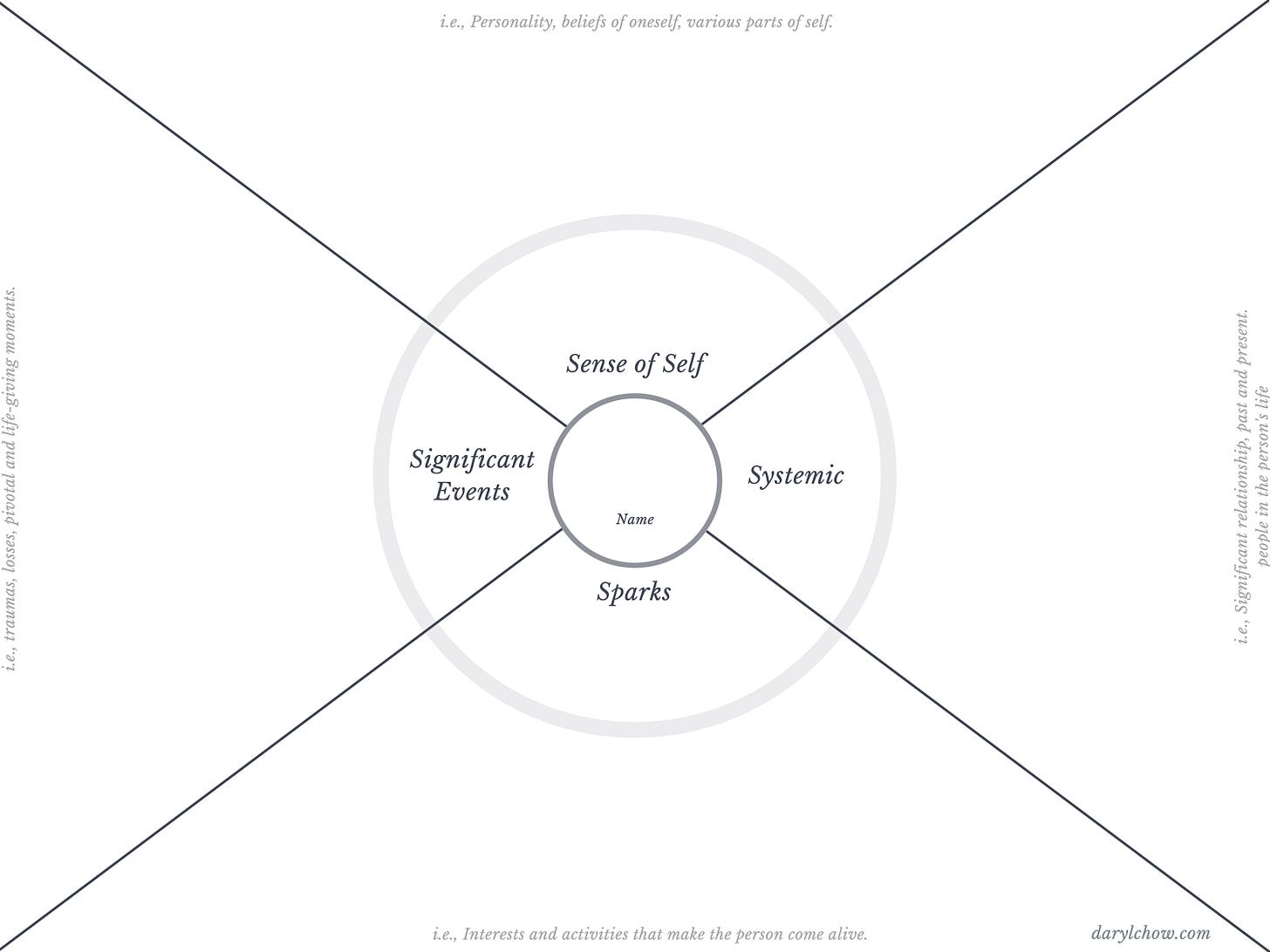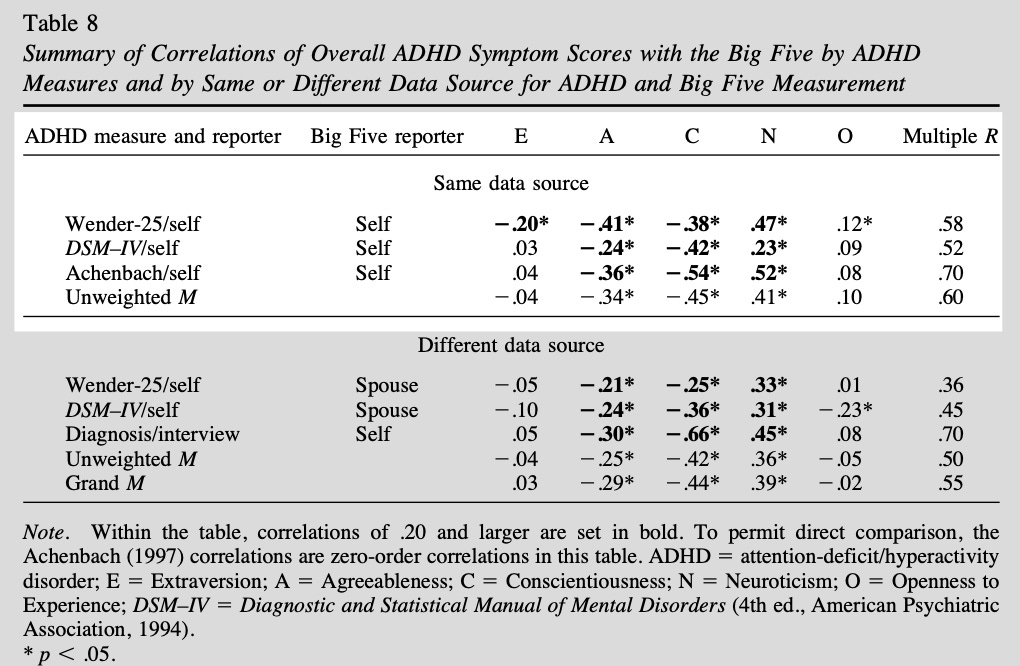Frontiers Friday #140. ADHD (Part II) ⭕️
Are there patterns of personality profiles in relations to people with ADHD?
One of the consistent things I’ve been doing in my clinical practice in the last few years is to assign a back-off-a-napkin score on the BIG 5 Personality scale.
This came to be because of my practice of using the 4Ss, which I’ve previously talked about, so that I develop a “feel” for each of clients—as well as to assist in my recollection of each of them.
In short, the 4Ss are
Sense of Self
Sparks
Significant Events
Systemic (Relationships)

Overtime, I found myself needing a reliable framework on how I could “picture” each person’s sense of self, and given the rigor of the five-factor model, I toyed with the following idea:
For each of the 5 factors, O.C.E.A.N, I assign a value ranging from -2 to +2.
openness to experience (inventive/curious vs. consistent/cautious)
conscientiousness (efficient/organized vs. extravagant/careless)
extraversion (outgoing/energetic vs. solitary/reserved)
agreeableness (friendly/compassionate vs. critical/rational)
neuroticism (sensitive/nervous vs. resilient/confident)
While I generally do not take a classical view that our personalities remain static over tim1, I’ve found this exercise useful, as one of my guiding principles I keep asking myself is “How do we nurture this person’s nature?”
How can we help this person come more alive by becoming more of who she is?
This got me thinking.
Are there patterns of personality profiles in relations to people with ADHD?
(Before you read on, take a notepad and scribble your guess. Write down O, C, E, A, N, and then estimate your prediction for each of the five factors within the range of -2 to +2 (i.e., lowest to highest)).2
So in this week’s Frontiers Friday, I’m gonna share with you what I’ve learned when I went down this rabbit-hole.
(If you missed Part I from last week, click here.)
This week’s #140 Frontiers Friday Five Recommendations on ADHD (Part II)
📽 Watch: ADHD and Big 5 Personality
In my “read-it-later” Readwise Reader app, I found this clip from a Q&A with Canadian psychologist Jordan Peterson with an audience member who was diagnosed with ADHD.
Love him or hate him, Peterson has a depth of knowledge in the Five-Factor Model (FFM) personality construct that might help us here.Key Grafs:
- The lack of play (based on Jaak Pankseep’s research) and it’s relationship with ADHD presentation.
- “If you're high in openness and high in extraversion and low in conscientiousness, low in agreeableness, and high in neuroticism you're likely to manifest symptoms of ADHD it's because you're exploratory you don't like to sit down you're full of ideas your attention scatters.”
- DC: Here’s my interpretation:
O +2
C -2E +2
A -2
N +2👓 Research-Read: A Meta-Analysis on ADHD and Personality
I thought I’d dig a little deeper.
Using AI research search tools like Elicit and ResearchRabbit3, I found this 2014 meta-analysis.
Take a look at this figure.
The diagram might be a little busy, so let’s try and distill it.
Key Grafs:
- Key features in the personality dimensions that can be speculated to be responsible for the associations with Inattention (IA) and Hyperactivity/Impulsivity (HI)
- ADHD is associated with low conscientious inhibition and agreeable inhibition, and high negative emotionality which implies that ADHD is associated with dysfunctions in both top-down and bottom-up control processes.
- Conscientiousness: Large associations for conscientious inhibition with ADHD, IA and HI.
- Agreeableness: relatively higher combined and HI than IA;
- Extraversion: No association with IA, but small positive association with HI.
- Neuroticism: all types/specifiers of ADHD individuals will have high scores for neuroticism4👓 Research-Read: Big Five Dimensions and ADHD Symptoms:
Here’s another interesting study examining the relationship between the Big-5 and ADHD Symptoms based on 6 studies in the US (N = 1620).
Here’s a useful summary table:
Key Grafs:
- The most consistently defined ADHD symptom domain, attention problems, was uniformly and strongly associated with low Conscientiousness and modestly related with Neuroticism.
- Hyperactivity-impulsivity is related to low Agreeableness.👓 Research-Read: Association of Attention-Deficit/Hyperactivity Disorder Diagnosis With Adolescent Quality of Life
Hat Tip to one of our readers of the Frontiers, Esther for highlighting this particular study in our previous missive, FF139 (ADHD Part I).
This study from JAMA (open access), really intrigued me.
The main question these researchers were investigating was
“Is an attention-deficit/hyperactivity disorder (ADHD) diagnosis in childhood or early adolescence associated with quality of life in adolescents?”
What the researchers did:
They took 393 teens at aged 14-15 with an ADHD diagnosis, and matched controlled another 393 teens with similar levels of hyperactivity/inattention symptoms, but with no ADHD diagnosis, and examined both groups’ quality of life (QoL).
Key Grafs:
- Among matched adolescents, an ADHD diagnosis was not associated with improved QOL but did have some negative associations, including an increase in risk of self-harm.
- “Our results indicate no beneficial associations of an ADHD diagnosis with adolescents’ QOL, which is highly concerning.”
QUESTION: Please read this study. What do you make of this? I would really love to hear your take about this study. Leave your comments below.⏸️ Words Worth Contemplating:
“You can do anything, but not everything.” ~Paula Pant.
Reflection
What is your nature? How would you map yourself on the Big-5, O.C.E.A.N, ranging from -2 to +2?
How do your nurture your nature?
Finally, how do you let who you are come out in the therapy room, in service of the therapeutic work with your clients?
Warm Welcome to New Folks on Frontiers of Psychotherapist Development (FPD)
If you are new here, I just want to say a big hello to you and would love to hear from you. Tell me a bit about you.
Click here to see more details about Frontiers of Psychotherapist Development and Frontiers Friday.
Notice Board
Webinar #1 of 2:
Here’s the recording of part one of two webinars that Scott Miller and I did for 100 people, in the pre-launch of our latest book, The Field Guide to Better Results.We are planning to launch the 14th Cohort of Reigniting Clinical Supervision (RCS) online training for clinical supervisors. Drop me me an email if you wish to be on the waitlist.
A new post from my other Substack, FullCircles, Warning: It's Not Just Your Attention
Daryl Chow Ph.D. is the author of The First Kiss, co-author of Better Results, and The Write to Recovery, Creating Impact, and the new book The Field Guide to Better Results .
Brian Little’s book, Who Are You Really? is an excellent guide to how our personalities can evolve over time.
I was wrong in my prediction one of the five factors, the Extraversion factor. There is something useful about getting it wrong at the outset, as I’m now hungry to figure out why to close the dissonance. This fuels the learning process.
If you are a researcher, I highly recommend you check out Elicit and ResearchRabbit.
I might have missed it, but I’m not so sure why this particular meta-analysis didn’t address the Openness to Experience factor in relations to ADHD.





What is your nature? How would you map yourself on the Big-5, O.C.E.A.N, ranging from -2 to +2? How do your nurture your nature?
O+2, C0, E-2, A0, N+2. Knowing these parameters I nurture my high N by focusing on self-care and embracing my rich introverted life. I can find the positivity in being highly neurotic by being more aware of subtleties while also learning to filter when in safe spaces. Being introverted can fuel my energy to recharge and engage in the world. I also have high sensitivity so the need for quiet time and organization is important. With high openness I nurture my creativity through art and writing.
Finally, how do you let who you are come out in the therapy room, in service of the therapeutic work with your clients?
Being humble, disarming, and reframing negative associations with personality. I think for highly sensitive people it is safe to disclose imperfections so they can feel more whole. My openness shows curiosity and fascination towards my client. With my artistic skills, I am spontaneous by using artful dialogue, activities, and exaggerated expression so they can feel their emotions (quite gestalt).
In response to the research paper you shared, I feel that diagnosing is important, but the way it's framed can impact the individual's future outlook. If the person diagnosing makes the client feel like their future will be tough, it's easy to carry shame and blame themselves. By nurturing their nature and having parents be aware of their predisposition they can learn to work with personality differences as they parent while advocating their child with other authority with less understanding. It think it's also important for the parents to have self-awareness in order to validate the child's inner experience.